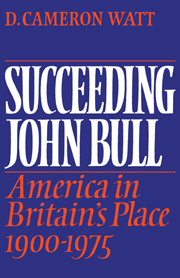Summary
The thirteen years between 1934 and 1947 are usually taken to comprehend at least four separate historical periods, pre-war, European war, world war and cold war. To treat them as a single unity or to divide them into less than four periods seems at first sight profoundly unhistorical. By the microhistorical standards applied to the writing of twentieth-century historical monographies this is no doubt true. But from the point of view of the participants these thirteen years were a unity of experience. And from the point of view of this study this feeling of unity is confirmed by the very considerable degree of continuity observable in the membership of the policy-making élites. The only real change observable occurred not in 1939, 1941 or 1945, but in the summer of 1940 when the membership of the élites was enormously widened. This was a result of the defeat of France and the successful demonstration of Britain's ability and determination to continue the war which led to an enormous increase, in both Britain and America, in the scope and number of the various groups active in various aspects of that ‘total foreign policy’ which is the political concomitant of total war.
In Britain, the entry of the Labour and Liberal opposition into coalition with the Conservatives, at whose head Winston Churchill had replaced Neville Chamberlain, was of importance principally in securing that Churchill's electoral defeat in 1945 involved no very major breach in the conduct and outlook of British foreign policy.
- Type
- Chapter
- Information
- Succeeding John BullAmerica in Britain's Place 1900-1975, pp. 69 - 89Publisher: Cambridge University PressPrint publication year: 1984

